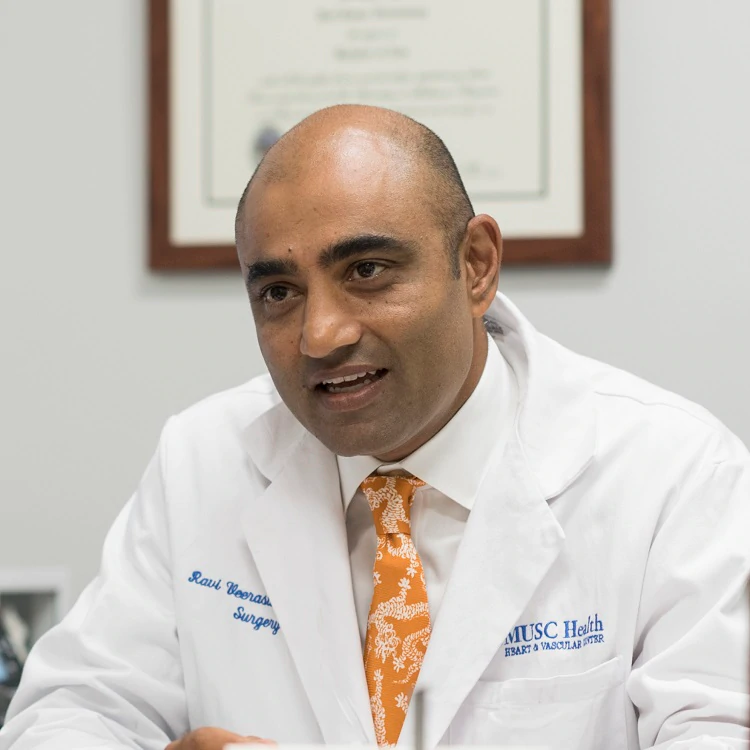Medtronic and Medical University of South Carolina Team Up to Improve Outcomes for Patients
Five-year value-based health care partnership will focus on acute conditions, chronic diseases and education.
Charleston, S.C., Feb. 14, 2019 – Medtronic and the Medical University of South Carolina (MUSC) are launching a new collaboration aimed at fundamentally changing the way health care is delivered to patients in South Carolina.
“Both of our organizations feel the need to transform the delivery of health care,” said MUSC President David J. Cole, M.D., FACS. “We believe this partnership will help us find new ways to deliver the best outcomes for patients at the lowest cost possible. That’s the true meaning of value-based health care.”
Under the five-year agreement, Medtronic and MUSC will jointly define and create programs intended to improve the health care experience and overall outcomes for patients while also reducing costs. The initial focus of the partnership will be on addressing acute conditions and chronic diseases such as vascular disease. More than three million South Carolinians are affected by at least one chronic disease, and it’s estimated that 21,000 lives could be saved every year in South Carolina through better chronic disease treatment and prevention.1
“This partnership is about getting the right care to the right patients at the right time,” said Christian Howell, vice president of U.S. value-based health care partnerships at Medtronic. “The combination of MUSC’s clinical and academic expertise with our therapies, technologies and operational expertise will help MUSC deliver quality care to patients."
Both of our organizations feel the need to transform the delivery of health care.
Medical University of South Carolina President David J. Cole, M.D., FACS
The Future of Healthcare
The goal of value-based health care is to move toward a system in which medical technology companies, hospitals and even health care providers are eventually paid based on patient outcomes. Most health care models currently base payments on the amount of services provided to patients, whether they’re effective for those patients or not.
“Together with MUSC, we are committed to fundamentally improving the way patient care is delivered,” said Omar Ishrak, Medtronic chairman and chief executive officer. “Medtronic has a long history of collaboration with health care providers to invent and develop new markets to solve a variety of clinical problems. The partnership with MUSC is an extension of that collaboration, as we look to systematically work together to develop scalable programs aimed at improving patient outcomes while reducing the cost of care.”
Initial programs in the partnership will focus on total joint replacements; vascular disease; and identifying and treating patients who suffer post-surgical breathing problems (respiratory compromise). While the financial details are different for each program, the financial structure of the partnership is unique because all the programs are tied to improving patient outcomes while reducing cost of care.
The focus on vascular health is particularly gratifying to Dr. Ravikumar Veeraswamy, director of vascular surgery at MUSC.
“South Carolina has one of America’s highest rates of limb amputation related to vascular disease,” he said. “If, for example, we can design a screening system that identifies people at higher risk of vascular disease sooner, we can then treat them sooner and spare more people the trauma of losing a limb to this disease. Prevention costs less than treatment, so it can also take cost out of the health care system. We believe this partnership can help us do that on a larger scale and impact more patients.”
Under the agreement, Medtronic and MUSC also plan to work together to implement a standardized care pathway program for joint replacement patients that addresses the bundled payment methodology implemented by the Centers for Medicare and Medicaid Services (CMS).
The episodic care pathway intends to leverage best practices and streamline processes to improve the quality of care for patients while reducing costs.
Similarly, Medtronic and MUSC also plan to standardize care pathways designed to reduce adverse events and optimize care for patients who can benefit from enhanced respiratory monitoring, or who need a tracheostomy procedure for breathing assistance.
Network of Partners
Both MUSC and Medtronic have networks of like-minded partners focused on advancing value-based health care.
This month, Medtronic is celebrating its one-year anniversary of partnering with Lehigh Valley Health Network (LVHN) in Allentown, Pennsylvania. The partnership was designed to find ways to improve patient care across more than 70 major medical conditions by focusing on better outcomes at a reduced cost of care. The progress being made at LVHN is expected to help implement and scale value-based programs at MUSC. Learn more.
In August 2018, MUSC announced a strategic partnership with Siemens Healthineers designed to create a blueprint of a transformed health care system that provides safe, equitable, timely, effective, efficient and patient-centered care. Learn more.
MUSC and Medtronic will explore opportunities to cross-share learnings with their respective partners and collaborate to improve patient outcomes while reducing costs.
“Patients do better when their care is coordinated, but today care is too often fragmented,” said Caroline Brown, director of external affairs at MUSC. “We believe that collaboration and innovation are required for meaningful change in health care. To transform care and to ensure the best patient outcomes, it requires working together with partners with diverse strengths. We’re very proud of the team of partners we’re building.”
We recognize that the shift to value-based health care is hard work, but we truly believe this approach offers the best pathway to better outcomes and reduced costs.
Omar Ishrak, Chairman and CEO, Medtronic
Educating the Next Generation
The Medtronic/MUSC agreement will be unique in many ways – including a first-of-its-kind effort intended to use what is learned in the partnership to educate the next generation of health care professionals about specific initiatives that demonstrate value-based health care. Medtronic and MUSC also plan to jointly publish clinical work around improving outcomes.
“While we already educate many MUSC students about the concepts of value-based health care, one goal of this partnership is to provide real world examples of how these concepts can be implemented,” said MUSC executive vice president for academic affairs and provost, Lisa K. Saladin, PT, Ph.D. “These examples will be integrated into our curriculum as we seek to provide students with the tools to engage in the development of value-based care models upon graduation.”
“We recognize that the shift to value-based health care is hard work, but we truly believe this approach offers the best pathway to better outcomes and reduced costs,” Ishrak said. “It requires a new way of thinking and the involvement of many stakeholders. It will take time. But we’ll get there,” he said.
References
1Partnership to Fight Chronic Disease: https://www.fightchronicdisease.org/states/south-carolina







